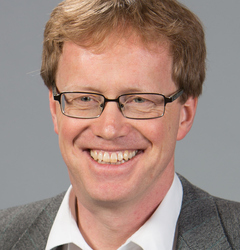
Andreas Herz
Trained in theoretical physics at LMU Munich and Georgia Tech, Andreas Herz completed a PhD with Leo van Hemmen at Heidelberg University, on Hebbian learning of temporal pattern sequences (1987-1990). They showed that signal delays (usually assumed to be a nuisance) allow one to store and retrieve such sequences as attractors in recurrent networks. As a postdoc with John Hopfield at Caltech, Herz then studied phase locking and other collective phenomena in networks with spiking neurons, and related earthquake models; he continued this work as a Beckmann Fellow with Klaus Schulten at UIUC. Back in Europe, he joined Robert May's group at Oxford in 1994, and worked on population dynamics, game theory and theoretical immunology. In 1995, Herz was offered a faculty position in Biophysics at the University of Bremen, and in 1996 became the Chair for Theory of Neural Systems at the newly founded Institute for Theoretical Biology at Humboldt-University Berlin. Since 2007, he has been at LMU Munich as Chair for Computational Neuroscience. Herz is interested in various aspects of neural dynamics and computation. Using methods from information theory and dynamical systems, he and his collaborators test their hypotheses by analyzing neurophysiological data from local and international collaboration partners. Current topics include: the neural basis of spatial navigation, in particular place and grid cells; information processing by dendritic spines and dendrites; and collective properties of neural systems. Herz has also worked on acoustic communication and auditory coding.
Program Visits
- The Brain and Computation, Spring 2018. Visiting Scientist.


